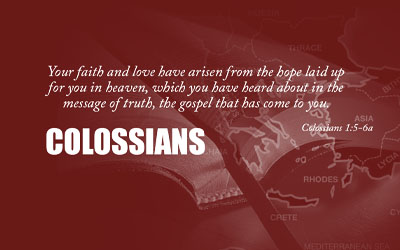Colossians 1:1-6
Faith, Hope, and Love.
(Bấm vào đây để đọc tiếng Việt)
Dear friends,
 I’m curious if you’ve noticed a distinguishing feature of my Sunday School teaching style over the years. It is most likely the most significant change in my approach to Bible reading or study.
I’m curious if you’ve noticed a distinguishing feature of my Sunday School teaching style over the years. It is most likely the most significant change in my approach to Bible reading or study.
I used to read books on meditation or self-improvement like How to Stop Worrying and Start Living, How to Win Friends and Influence People, and countless other books on existentialism like those written by Hermann Hesse, among others, before I came to Christ. But no matter what kind of books I read, the focus is always on the “self,” on myself.
When I became a believer, I discovered that the Bible was in a league of its own. But I made the same mistake I used to make: I read the Bible in the same way I read other books. I read it with the intention of bettering myself. This means that the ultimate goal is still the “self.” As a result, it wasn’t long before I was back in the vicious cycle with no way out.
Thanks be to the Lord, someone pointed out to me a few years ago that I was misinterpreting the Bible. As I stated in the previous paragraph, I read the Bible solely for the purpose of discovering ways to improve myself; God is merely a means to that end. I should have read the Bible to learn more about God. Because if the Bible says anything about me, it’s about my hopelessly lost state, and the only thing I can do is keep my eyes fixed on Christ, who is the author and finisher of my faith (Hebrews 12:2). In short, if you can only derive principles for self-improvement from a Bible passage, you will find yourself, not God.
We’ve started studying the book of Colossians, which contains many foundational truths, and have gathered the following main points. As a reminder, nearly all of the foundational truths are about Jesus, and if there is anything about us, it expresses God’s expectation that we will believe in Him.
1. FAITH, HOPE and LOVE
“4Since we heard about your faith in Christ Jesus and the love that you have for all the saints. 5Your faith and love have arisen from the hope laid up for you in heaven, which you have heard about in the message of truth, the gospel that has come to you.” (Colossians 1:4-5)
First Corinthians 13:13 describes three characteristics of those who belong to God: “faith, hope, and love,” which is also expressed in the verse we’re looking at today. According to the quoted passage, Paul demonstrates the driving force behind faith and love: “hope.” To put it another way, this “hope” is the anticipation of the inheritance God has set aside for us in the heavenly places. As a result, faith and love are simply the fruits of the hope for eternal life.
So, if you want more love and faith in God, consider why you follow Christ. Consider whether the hope of eternal life was the primary motivation because it is the source of the two things you desire. I also believe that everything else in your life stems from that primary factor.
2. TRULY UNDERSTAND GOD’S GRACE
“ In the same way, the gospel is bearing fruit and growing throughout the whole world—just as it has been doing among you since the day you heard it and truly understood God’s grace.” (Colossians 1:6)
This has been our class’s unwavering focus over the years. Someone once asked me why we keep focusing on law and grace when there are so many other practical topics such as tithing, social responsibility, family relationships, prayer, fasting, church life, healing, demon casting, and so on. These topics are mentioned in the Bible, but they are not part of the gospel; rather, they serve as a backdrop against which the gospel can be presented. Much like a painting, the artist uses a variety of colors and brush strokes, but the main focus is on the main subject.
God’s grace is the gospel, the grace against which the law only serves as a backdrop to bring out its wisdom and the hope brought forth by the gospel of grace. If you spend your entire life reading the Bible in order to find only its fruit or byproduct, you will never know the God of that gospel. As a result, let us strive to “truly understand God’s grace.”
3. WHAT IS AN APOSTLE?
We watched a short video this week called “WHAT IS AN APOSTLE?” The video listed three basic requirements for an Apostle of Christ in this film, such as being one of Jesus’ 12 Apostles. We must distinguish an Apostle of Christ from roles in the church today where the term apostle (lowercase) may also apply, such as pastor, missionary, elder, deacon, or someone in charge of a specific ministry.
Below is the list of qualifications for an Apostle:
1st person eye-witness of Jesus Christ (Acts 1:22; 10:39-41; 1 Corinthians 9:1; 1 John 1:1)
Directly appointed by Christ (Mark 3:14; Luke 6:13; Acts 1:2; 10:41; Galatians 1:1)
Ability to work miracles (signs) of the Apostles (Matt 10:1-2; Acts 1:5-8; 2:43; 4:33; 5:12; 2 Corinthians 12:12)
Regarding the question of whether Paul is a true Apostle of Christ, the answer is yes, Paul is a true Apostle of Christ for the following reasons: 1) He was a first-person eyewitness to Jesus Christ, 2) Though he was not chosen by Jesus before his crucifixion, he did choose Paul when they met on the Damascus road, and 3) Paul possessed the ability to perform miracles.
In the video, the speaker claims that no one today can perform signs and wonders like Jesus’ Apostles, such as raising the dead, giving vision to the blind, and healing cripples so they can walk. Despite this, the speaker believes that God continues to work miracles in accordance with his sovereign will. Only the ability to perform miracles like the Apostles has ceased.
Every day that I live is a miracle in my mind. It’s a miracle that so many blood vessels return blood to my heart and that so many cells perform their functions without becoming cancer cells. This miracle occurs not only for believers, but also for unbelievers. However, it appears that the miracles God performs for thousands to witness have ceased. Is it because the miracles that announced the arrival of the Messiah were accomplished?
What about each member of our congregation’s experience? Has anyone here witnessed a genuine miracle? Is there any evidence of such miracles on YouTube?
But we don’t have to go far. Many people in our congregation have died as a result of diseases, including members of my own family. But there is a greater miracle, one that is even greater than the miracles that Jesus performed long ago, a miracle that I personally experienced and will never forget: the miracle of accepting Christ as my Savior. It’s the kind of thing God still does for those who believe in Him.
“I tell you the solemn truth, the person who believes in me will perform the miraculous deeds that I am doing, and will perform greater deeds than these, because I am going to the Father.” (John 14:12)
Jesus performed miracles to raise the dead, but they will eventually die, whereas today, if someone comes to Christ through a testimony, they will have eternal life. That is the greater miracle that we can now perform as a result of Jesus’ death and resurrection.
“But he answered them, “An evil and adulterous generation asks for a sign, but no sign will be given to it except the sign of the prophet Jonah.” (Matthew 12:39)
“For false messiahs and false prophets will appear and perform great signs and wonders to deceive, if possible, even the elect.” (Matthew 24:24)
The sign of the prophet Jonah foreshadows Jesus’ death and resurrection. The video is merely a warning tool about false prophets and their false signs and wonders. If God continues to give the gift of healing or other signs today, miracles will be their most powerful witness. It makes no difference whether someone believes or not. No one can prevent a miracle from someone who is truly gifted by God.
Nghi Nguyen
- Scripture quoted by permission. All scripture quotations, unless otherwise indicated, are taken from the NET Bible® copyright ©1996-2006 by Biblical Studies Press, L.L.C. All rights reserved.
Disclaimer: This is my own opinion on the topic, which does not necessarily reflect the church's theology, or beliefs of the individuals in it — Nghi Nguyen
